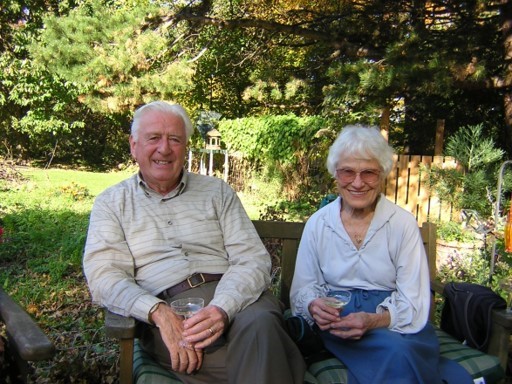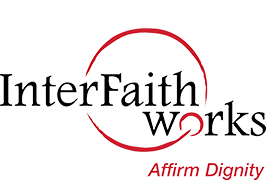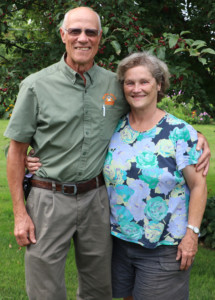
During their lifetime, Robert and Roberta Grimm devoted their efforts and resources to their faith community and refugee causes.
100-Plus Years
In the Making
Rooted in Thrift, Doing Social Good,
Grimm Family’s Gift Sets
Example for Others
At the opening chapter of our story is Norman Grimm, then living in Chicago. Norman put aside 25 cents each week beginning in 1911 while in high school to purchase stock in the company where he was employed stocking supplies. He would work his way up to become vice president of sales. By the 1940s, the company, Pfizer, had grown to become a world leader in the production of penicillin and is now one of the world’s largest bio-pharmaceutical companies.he story of the Grimm family’s gift to InterFaith Works stretches across three generations and more than two lifetimes. The ending hasn’t been written yet as the story continues to this day with refugees and others served by InterFaith Works.
“He continued buying stock his whole life at the company,” Michael Grimm said, recalling his grandfather’s savings habits. It added up, leaving a small fortune to Michael’s father, Robert.
“It was part of his (Robert’s) mission to give it all away,” said Karen Grimm of her father-in-law and his inheritance.
Unlike his father, Robert’s pursuits were focused outside of business. He believed in supporting justice work, according to Karen, whose own long history of volunteerism includes assisting refugees, leading sewing classes and organizing the giveaway of refurbished bicycles at InterFaith Works.
“Even more than dad, church was very important to mom,” Michael said, remembering his mother, Roberta, who died in 2017 and outlived her husband, Robert, by eight years. “There were church suppers, and going to church every Sunday was expected. That’s what you did if you were one of the Grimms.”
Today, Michael owns and operates a landscaping and tree service business in Central New York.
Robert, who served in the Navy during World War II, met Roberta Pauline Johnson at Denison University in Ohio. Bob and “Bobbie” would go on to raise a family with six children. (Son Michael and daughter Leslie Grimm Archer are the only two of the six still living in the Syracuse area.)
Robert graduated from Colgate Rochester Divinity School and became pastor of his first church in South Dakota. He soon chose to focus his career on interdenominational and ecumenical ministry, serving as executive of the South Dakota State Council of Churches and then the Council of Churches in Erie, Pa. Robert’s ministry continued in Syracuse from 1965 to 1976 and finally in Buffalo from 1976 until his retirement in the 1990s. The organization that Robert served in Syracuse was first called the Syracuse Area Council of Churches, then became the Syracuse Area Interreligious Council, which was the direct predecessor to InterFaith Works.
“They traveled a lot during those years,” Michael said of his mother and father, explaining their travel was mostly connected to religious gatherings. Though they traveled throughout the U.S., the Grimms also visited Palestine and Israel, as well as South Africa and Zimbabwe, and developed an interest in the plight of refugees.
“Lots of refugees called them grandpa and grandma,” Karen Grimm said of her in-laws. “They hosted many people in their home over the years.”
In their later years, Robert and Roberta Grimm would establish a charitable trust managed by the Community Foundation of Greater Buffalo. After their passing, the proceeds would benefit the organizations they supported. A portion of those funds were bequeathed to InterFaith Works of Central New York.
The gift from the Roberta J. Grimm Charitable Trust is serving several purposes. The vast majority is directed at the agency’s Endowment Fund. A portion is helping InterFaith Works’ Center for New Americans meet the immediate needs of refugees served by the agency. And, a smaller amount was added to the principal of the Nona Stewart Fund for Refugees held at the Central New York Community Foundation.
“Dad always said he was going to give all the money away so we wouldn’t be bothered,” Karen fondly recalled. “He used to say that all the time.”
Editor’s Note: This story was originally published in the Fall/Winter 2018 issue of the InterFaith Works publication On Common Ground.
![]()
To donate securely online using a credit/debit card, click the “Donate” button here: Donate (Preferred)
To donate securely online using PayPal, click the “Donate” button here: Donate

